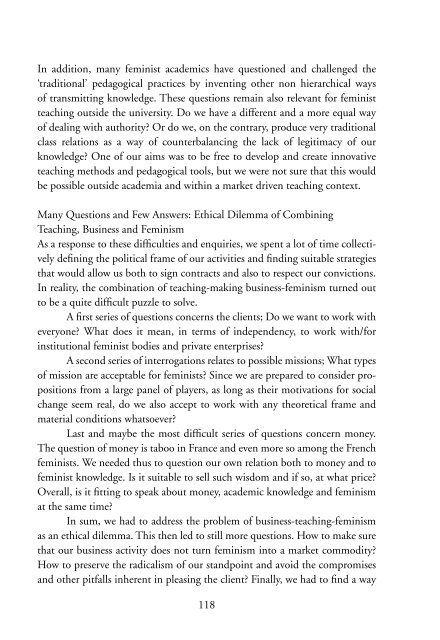Teaching with the third wave new feminists - MailChimp
Teaching with the third wave new feminists - MailChimp
Teaching with the third wave new feminists - MailChimp
Create successful ePaper yourself
Turn your PDF publications into a flip-book with our unique Google optimized e-Paper software.
In addition, many feminist academics have questioned and challenged <strong>the</strong>‘traditional’ pedagogical practices by inventing o<strong>the</strong>r non hierarchical waysof transmitting knowledge. These questions remain also relevant for feministteaching outside <strong>the</strong> university. Do we have a different and a more equal wayof dealing <strong>with</strong> authority? Or do we, on <strong>the</strong> contrary, produce very traditionalclass relations as a way of counterbalancing <strong>the</strong> lack of legitimacy of ourknowledge? One of our aims was to be free to develop and create innovativeteaching methods and pedagogical tools, but we were not sure that this wouldbe possible outside academia and <strong>with</strong>in a market driven teaching context.Many Questions and Few Answers: Ethical Dilemma of Combining<strong>Teaching</strong>, Business and FeminismAs a response to <strong>the</strong>se difficulties and enquiries, we spent a lot of time collectivelydefining <strong>the</strong> political frame of our activities and finding suitable strategiesthat would allow us both to sign contracts and also to respect our convictions.In reality, <strong>the</strong> combination of teaching-making business-feminism turned outto be a quite difficult puzzle to solve.A first series of questions concerns <strong>the</strong> clients; Do we want to work <strong>with</strong>everyone? What does it mean, in terms of independency, to work <strong>with</strong>/forinstitutional feminist bodies and private enterprises?A second series of interrogations relates to possible missions; What typesof mission are acceptable for <strong>feminists</strong>? Since we are prepared to consider propositionsfrom a large panel of players, as long as <strong>the</strong>ir motivations for socialchange seem real, do we also accept to work <strong>with</strong> any <strong>the</strong>oretical frame andmaterial conditions whatsoever?Last and maybe <strong>the</strong> most difficult series of questions concern money.The question of money is taboo in France and even more so among <strong>the</strong> French<strong>feminists</strong>. We needed thus to question our own relation both to money and tofeminist knowledge. Is it suitable to sell such wisdom and if so, at what price?Overall, is it fitting to speak about money, academic knowledge and feminismat <strong>the</strong> same time?In sum, we had to address <strong>the</strong> problem of business-teaching-feminismas an ethical dilemma. This <strong>the</strong>n led to still more questions. How to make surethat our business activity does not turn feminism into a market commodity?How to preserve <strong>the</strong> radicalism of our standpoint and avoid <strong>the</strong> compromisesand o<strong>the</strong>r pitfalls inherent in pleasing <strong>the</strong> client? Finally, we had to find a way118
















